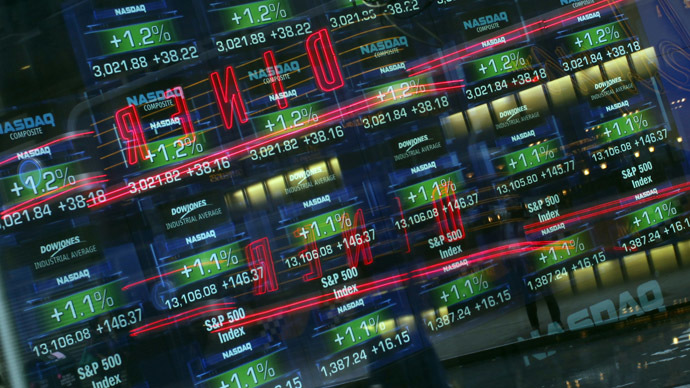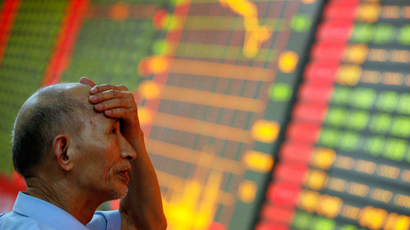NASDAQ longest downtime adds to woes over glitches in electronic trading

The latest disruption at NASDAQ– the longest trading halt in the floor’s history and also the biggest one since Hurricane Sandy last year - has again raised questions over potential dangers of the super-fast electronic trading systems.
The high-tech floor dominated by such great names as Microsoft, Apple and Google halted trading for three hours on Thursday. The NASDAQ attributed the disruption to a break at a feed that distributes all quotes and prices for the listed stocks.
Trading in 2,500 US-listed companies got back on track just thirty minutes before the normal market close, leaving investors outraged.
“It’s positive that the market was actually up, [I] can’t imagine what would have happened if this was [Wednesday] when the Fed minutes came out,” as the Financial Times (FT) quotes Paul Hickey, co-founder of Bespoke Investment Group.
“These types of things happen, but it seems they happen a lot more than they used to,” Paul Hickey said. “You’d think with technology you’d have less of this occurring.”
The three-hour trading halt on the NASDAQ followed a series of tech-rooted disasters involving various exchanges.
They included Facebook's bungled public offering launch on NASDAQ
in May 2012, one of the largest IPOs in history. The SEC later
fined NASDAQ $10 million for that disruption - the largest
penalty it has ever imposed on an exchange.

The aftermath
The damage of such disruptions can’t be overestimated, as NASDAQ -listed companies accounted for 28 percent of all shares traded so far this month, according to data from BATS Global Markets Inc.
“The NASDAQ is such a huge part of stocks that are listed and the overall volume. If you can’t trade a NASDAQ-listed stock or an ETF linked to it, you are losing such a huge part of the overall equity market,” a managing director at a large Wall Street trading firm told the Financial Times (FT).
Experts say the repeated disruptions could undermine investor confidence at a time when US stocks are trading close to their record high levels.
Stock trading now relies heavily on computer systems that exploit split-penny price differences. Stocks can be traded in fractions of a second, often by automated programs, which makes the markets more vulnerable to technical failures.
The NASDAQ disruption could also trigger new rounds of regulatory scrutiny on computer-driven trading, though so far almost nothing has been done in practice.
After the 2010 market break, regulators “never really developed a fix for it, and these kinds of things are going to continue to happen,” said Michael Greenberger, a law professor at the University of Maryland who was the top market oversight official at the Commodity Futures Trading Commission in the late 1990s. High-speed trading commanded by mathematical formulas rather than people brings “the possibility of a calamity,” Greenberger said.
Back in 2010, the Dow Jones industrial average plunged hundreds of points in mere minutes, which was later coined a “flash crash”. A months-long investigation by regulators concluded that the sudden drop occurred when a trading firm executed a computerized selling program in an already stressed market. The trade, worth $4.1 billion, led to a chain of events that ended with traders swiftly pulling their money from the market, the review found.













